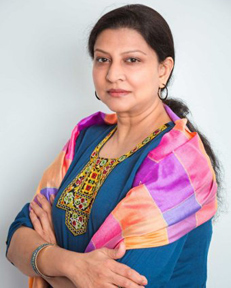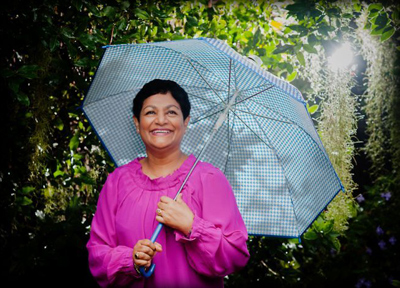Portraits in Pink
Exhibition to encourage mammograms among Indian and
Sri Lankan women for early detection of breast cancer:
by Mohamed Taha
|

Manisha Vyas was diagnosed with breast cancer in 2010. NSW
Multicultural Health Communication Service |
A photo exhibition aiming to increase breast cancer screening and
tackle the culture of silence within the Indian and Sri Lankan
communities has launched in western Sydney.
The Portraits In Pink exhibition features images and the stories of
14 breast cancer survivors wearing saris or traditional subcontinent
clothes at the Blacktown Arts Centre for the next fortnight.
It is part of the Pink Sari Project campaign which aims to change
attitudes and make mammograms fashionable in the Indian and Sri Lankan
communities by linking breast cancer screening with the cultural
elegance of the sari attire.
Project leader from NSW Multicultural Health Communication Service
Michael Camit said the objective was to encourage more tests for Indian
and Sri Lankan women aged between 50 and 74 who were not using free
screening services such as BreastScreen.
“For some groups, such as women from Indian and Sri Lankan
backgrounds, participation is much lower,” he said.
“The Cancer Institute of New South Wales reports the vast majority of
women who speak Hindi from India or Tamil from Sri Lanka do not
regularly attend BreastScreen.”
Exhibition curator Kevin Bathman said there was initial doubt about
the idea but the response had been great.
“We were basically told by the communities, you’ll be lucky if you
get one or two women who are open to sharing their stories,” he said.
“The response has been really overwhelming because we had 14 women who
came forward and told us they were willing to share their experiences.”
Cancer survivors urge women to get tested early
One of the participants is Pendle Hill mother-of-two Manisha Vyas,
aged 46.
Born in India, she migrated to Australia in 1997 and in 2010 was
diagnosed with breast cancer.
“One day, I just felt a thickening texture on my left breast that
lasted for a few days,” she said.
“After 15 days, I visited doctors and went through all the tests and
got diagnosed with Invasive Lobular Cancer.Ms Vyas said she was taking
part in the exhibition to tackle the taboo nature of female-related
diseases within subcontinent communities.
“In many subcontinent communities, women who have had this disease
are subjected to discrimination,” she said.
“They become vulnerable as they perceive mastectomy as loss of their
femininity“I like to tell them that there are many other ways to express
your femininity and you should not be afraid to talk about it.”
Another participant is Cherrybrook mother Padmini Peris, aged 59.In
1985 she migrated from Sri Lanka as a single mother and in 2000 was
diagnosed with cancer at age 43.
|

Padmini Peris was diagnosed with cancer at age 43 in 2010.
Vijitha Rajani
Uthayamalar No, we don’t hate men - Picture: Getty NSW
Multicultural Health
Communication Service |
“I found a lump on my left breast, it was a very palpable lump,” she
said.
“I had to go through the treatments, chemotherapy, radiation,
surgery.
“I remember the time I lost my hair when I washed it and all of a
sudden, there were strands all over the bathroom floor.”
Ms Peris recovered and later in 2011, she was diagnosed again with
breast cancer on her right breastShe is now in remission and as part of
her treatment has an annual mammogram.
Ms Peris said there are cultural reasons why women from subcontinent
communities did not get mammograms.
“Modesty reasons, most of the ladies don’t like to go to the doctors
for privacy reasons. Most of the ladies also give preference to their
family and they put themselves last,” she said.
Social and cultural barriers to getting mammograms
Westmead Breast Cancer Institute director Dr Nirmala Pathmanathan
said there were several cultural and social challenges for subcontinent
women “It’s viewed as a social stigma, it’s not something they want to
publicise or even know about,” she said.
“There’s the cultural barrier of not wanting to undress, it’s quite
an invasive procedure, you have to undress to have your mammogram.“Some
of the women I’ve spoken to have referred to what is called ‘karma’ -
it’s something like a punishment on them for example.”
Dr Pathmanathan said the exhibition would be effective as it is
grass-roots focused.
“Mothers will talk to sisters, will talk to daughters, will talk to
friends and aunties in the community,” she said“It takes away that fear
and stigma knowing that there are beautiful women out there who’ve had
breast cancer and survived.
“My message to all women between the ages of 50 and 74 is to get a
mammogram, early detection will save lives.”
-ABC
|

